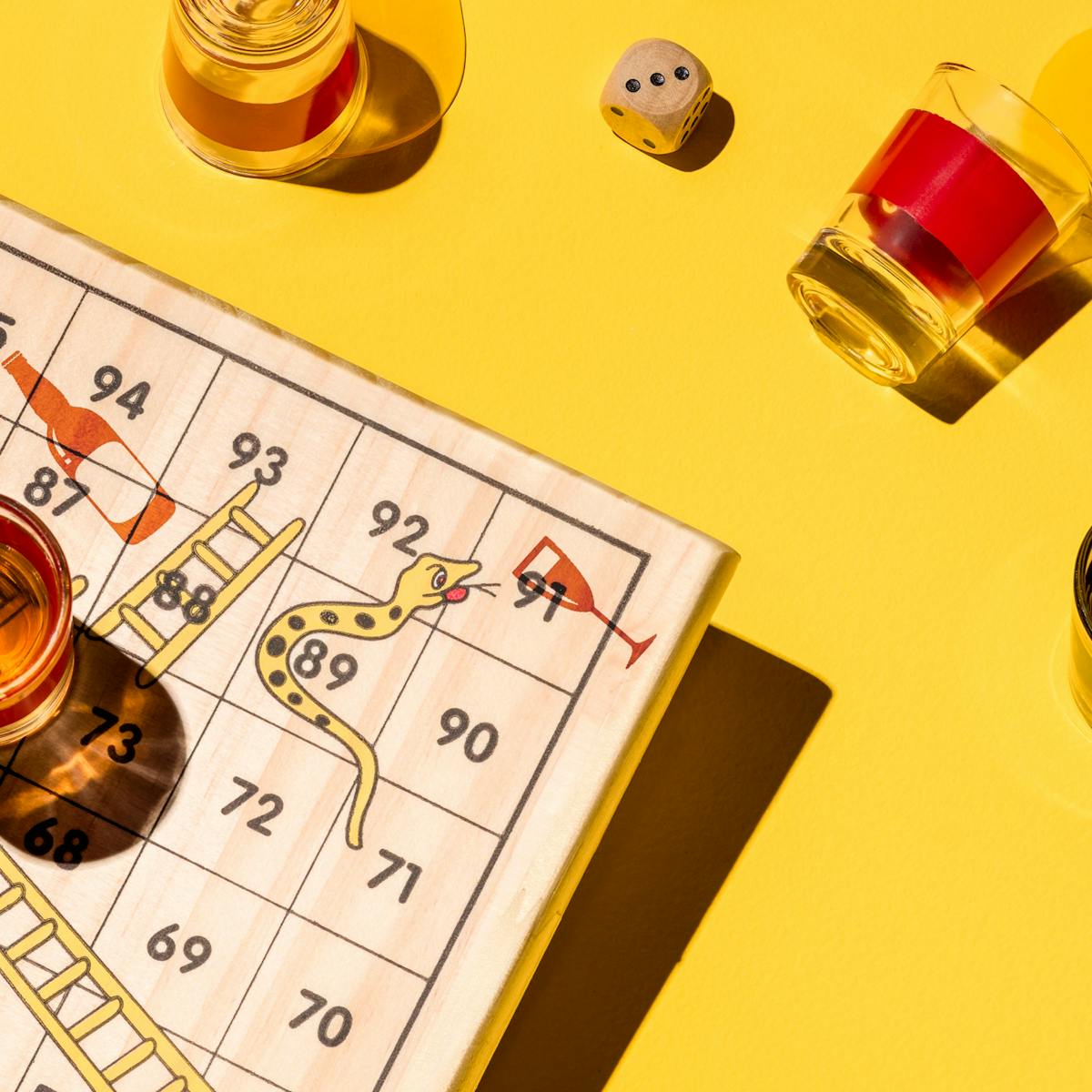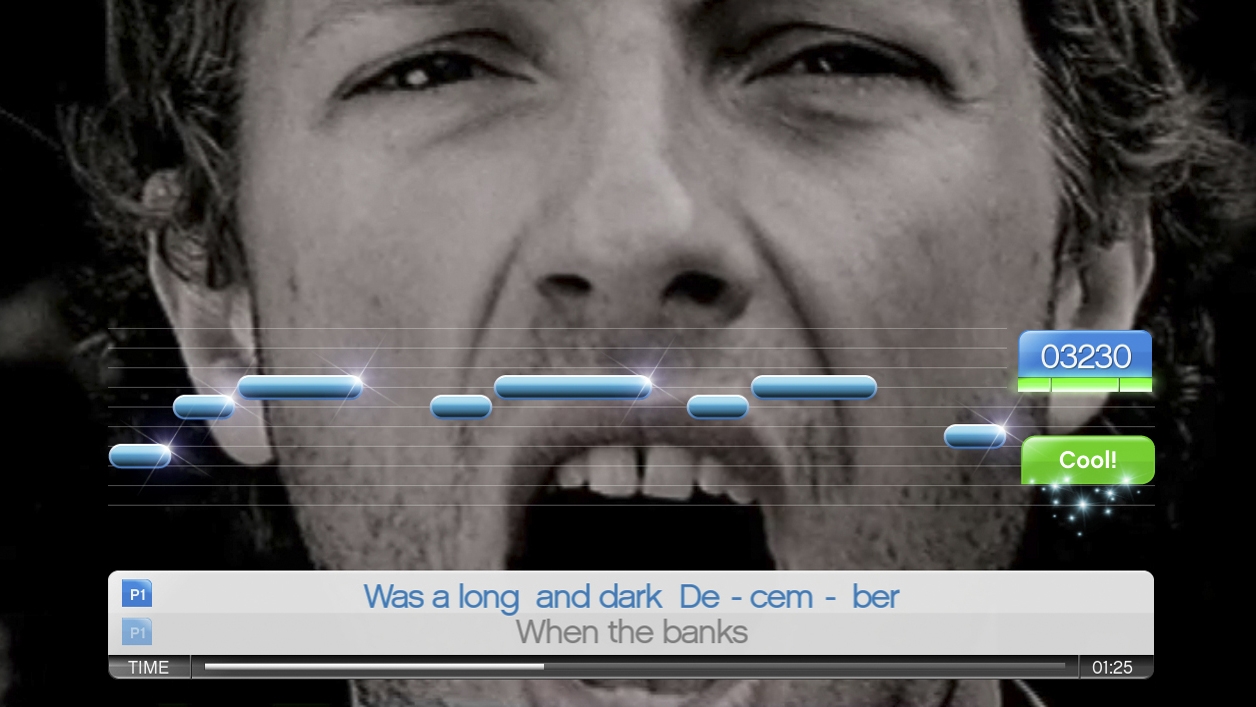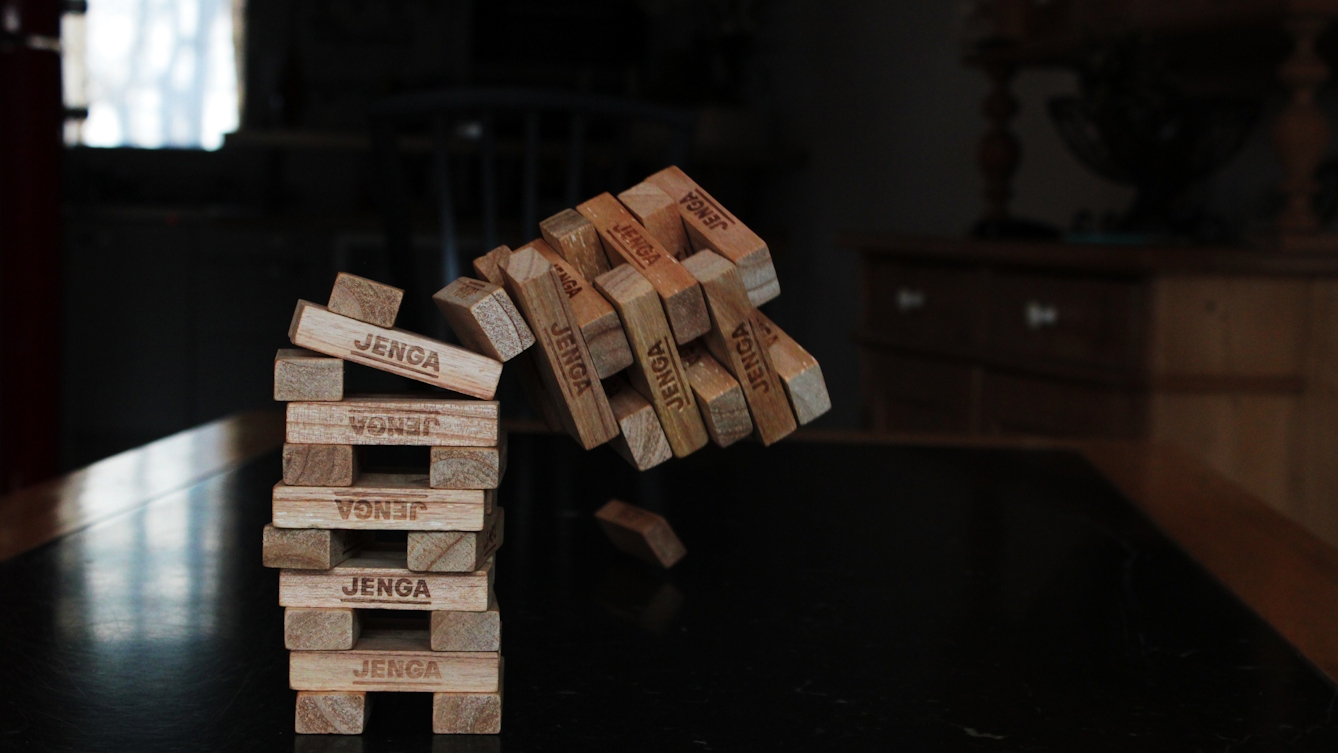Sophistication. Accuracy. Incisive wit. The drunker you get, the further you leave these qualities behind. Read on for fast, funny games that make the most of this familiar altered state.
How to play with drunk people
Words by Holly Gramazioaverage reading time 9 minutes
- Serial

Okay, first things first: even if you’re an enthusiastic drinker, you should read this article when you’re sober. If you then get drunk and decide to try out one of the games, great, but don’t read this for the first time when you’ve been drinking and want something to play.
If it’s too late for this advice and you’re tipsily googling “games to play drunk” while your friends stare expectantly and wait for instructions, then honestly, just play Pictionary. I know you don’t have cards: try a random word generator, or get everyone to open a book on any page and draw the first interesting noun they find.
Right, now that that’s out of the way: drinking.
I came to drinking slightly late; I was in my mid-20s before I had more than a polite sip of champagne. I like it! I like being a bit drunk when I’m around friends who are also a bit drunk. I like the sense of relaxation, and the increased communal willingness to try something silly, and the intensity. I like the way drinking accelerates the lifecycle of inside jokes. I like how being a bit drunk dulls my almost-constant freelancer sense that whenever I’m not working, I should probably be working.
Drinking also changes how people play. Look at Vapours, which comes up as a game for rowdy friends “all in a state of intoxication” in Ben Jonson’s 1614 play ‘Bartholomew Fair’:
Vapours
(Adapted from ‘Bartholomew Fair’.)
Sit in a circle. Somebody begins by saying something – anything they like.
Someone else – contradict them! Whatever they said, you think something else, and you think it really strongly!
A different someone else – hey, who just said that? What did they say? That doesn’t sound right! It’s your turn to talk! Say whatever you like – as long as you contradict the person who went before you.
Carry on until you don’t want to play any more, or until someone fails to disagree.
It’s such a tiny, slight set of rules, almost impossible to fail at, but that simplicity and aimlessness is part of what makes it work for the drunk. Games for drunk people shouldn’t just be games that are ideal for sober people that work for drunk people as well. Instead they should be games that benefit from a shorter attention span, from distractability, from easy amusement.
Luckily, games like this are easy to find. Try this one, adapted from a famous list of games that Gautama Buddha suggested were not suitable for monks, who have better things to do with their time. For drunk non-monks, it’s a good time.
Shape Up
Sit outside somewhere on a hot evening with a bowl of water.
Take turns to dip your hand into a bowl of water, and then – quick! Press your hand down onto a flat surface, trying to make a shape as you do.
Everyone else takes turns to guess what the shape you’ve made is. You choose your favourite guess. If someone gets it right, better still.
If you run out of space for shapes, wait until the water dries up and start again.
Singing and space travel
The relationship between games and drinking is complicated by the fact that some of the functions that drinking fulfils – a social structure, a focus, a reason to get together, something to do with your hands – are functions that are also fulfilled by games.
Think about karaoke, and about the PlayStation megahit SingStar. Drinking isn’t mandatory for karaoke, but at least in the UK the default assumption tends to be that karaoke happens with a drink in hand and another already inside. The drinking decreases participants’ self-consciousness, and provides an alibi for bad singing or enthusiastic dancing.
Singalong with Chris when you play SingStar.
Compare this to SingStar, which presents players with a song and gives points for how well they hit the notes. For good singers, this can be frustrating: it penalises them for putting their own stamp on a song. But for the rest of us? Speaking as an exceptionally bad singer who sometimes struggles to feel comfortable at karaoke, I never had a problem with SingStar. The points system is a distraction from self-consciousness. It’s an alibi. It’s an excuse.
Just like drinking.
So, given that games and drinking can fulfil similar social functions, what happens when you combine them? Well, they can support each other – or they can undermine each other.
In the UK the default assumption tends to be that karaoke happens with a drink in hand and another already inside,
Sam Sheffield’s game DunDunDunDun plays with this tension. It’s a videogame where players compete to move awkward spacecraft around a screen. The unwieldy steering is controlled by a traditional game controller: so far, so unremarkable. The speed of movement, however, is controlled by blowing into a breathalyser: the higher your blood alcohol content, the faster your spacecraft goes.
The ideal player is drunk enough to power their spacecraft, but not so drunk that they can’t steer it. This feels like a metaphor for the ideal good-times party-game player, someone who has perhaps had a drink or two and is really ready to commit to a game, but who isn’t yet incoherent. But given that Sheffield himself rarely drinks, perhaps the game is more ambivalent than it seems.
An awkward drinking game
Another drinking game, Lee Shang Lun’s Washing Machine, is much more explicit about its critique of alcohol’s role in social contexts. In this one-off performance at a night of games in a Melbourne bar, Lee – wearing only his underpants – set himself up at a table with a deck of cards and a bottle of rum. Players could challenge him to a simple card game and if they won, paint a part of his body white; if they lost, they had to feed him a shot of rum.
It’s an intense, deeply uncomfortable game that digs into Australian attitudes to race and drinking, and to the nation’s history as an invading penal colony whose first riots were about access to alcohol.
Lee himself, who had never drunk before, ended the night with only a quarter of his bottle of rum left, and he remembers little of the performance beyond scattered moments, some of them reconstructed from photos and stories. These include spraying water from his mouth over the crowd, wetting himself as he stumbled to the toilet to throw up, feeling desperately unhappy but unable to stop grinning, gradually losing his ability to explain the premise of the game to its participants.
From a callous, game-design perspective, one of the things that Washing Machine therefore demonstrates is that drunkenness is not a single state to step into, but a state in constant flux, a malfunction that our body earnestly tries to fix for us even as we pour another drink. Another is that whether we’re drinking ourselves or not, the presence of alcohol changes the atmosphere for play.
Jenga will test your drunken coordination.
Even in contexts less fraught than Washing Machine, there’s no perfect game for drunk people, though there are characteristics that work better than others. Board-games writer Matt Thrower recently asked on Twitter about games that people liked to play “completely wasted”; answers tended towards simple, fast, creative games like Telestrations, a commercial version of a traditional drawing game, or dexterity games like Jenga. A lot of people went for Monikers, a commercial version of the Hat Game.
The Hat Game
To start, everyone grabs four or five scraps of paper. On each one, write the name of a different famous person (fictional or real), and then five words and phrases associated with them. Fold the pieces of paper into quarters.
Now put all the names into a hat.
Takes turns to draw a name out. Then, just like with the game Taboo, try to describe the person so someone else can guess them – without using any of the associated words and phrases. Keep going, taking turns around the circle, until all of the names have been pulled out.
Okay, great. That’s a good start. Now put the pieces of paper, folded over again, back in the hat. And play again, from the beginning. But this time, instead of being able to say whatever you like except the forbidden words, you can only say one phrase with a maximum of five words. You still can’t say any of the words on the paper or repeat any of the clues used in the first round.
Good. Fine. Getting there. But now, last round: all the names go back in. This time, when you draw a name out, instead of speaking, you can only mime. Keep going until all names have been guessed or given up on.
Special notes: in the first round, you can’t guess any names that you put in the hat (it’s fine to guess them in subsequent rounds). If you want to keep score, then for each round that’s correctly guessed, give the guesser and the describer a point each.
Simplicity and repetition
The best games for drunk people are familiar to at least one of the players in the group, and preferably more. They’re funny. They’re simple. They don’t require anyone to make any sort of judgement call about physical, mental or emotional safety. Maybe they invite people to perform or sing or draw or do something else they might feel awkward about: the structure of the rules and the lower self-consciousness of someone who’s been drinking can pull in the same direction.
Finally, they should be games that repay repeat play. Perhaps the most true thing about drunk players is: once they find something that’s fun, they stick with it. You can’t stop them from having the wrong kind of fun, and make them have another, more sophisticated type of fun instead. You can’t get them to switch game because you think variety will make for a more memorable evening. You just have to set things up and let everyone get on with it.
About the author
Holly Gramazio
Holly is a game designer, curator and writer based in London. She works both independently and as half of Matheson Marcault. Her recent projects include the collaborative drawing game Art Deck and the script for the video game Dicey Dungeons. She founded Now Play This, a festival of experimental game design based at Somerset House in London, and is interested in games that get people creating or looking at their environments in new ways.


